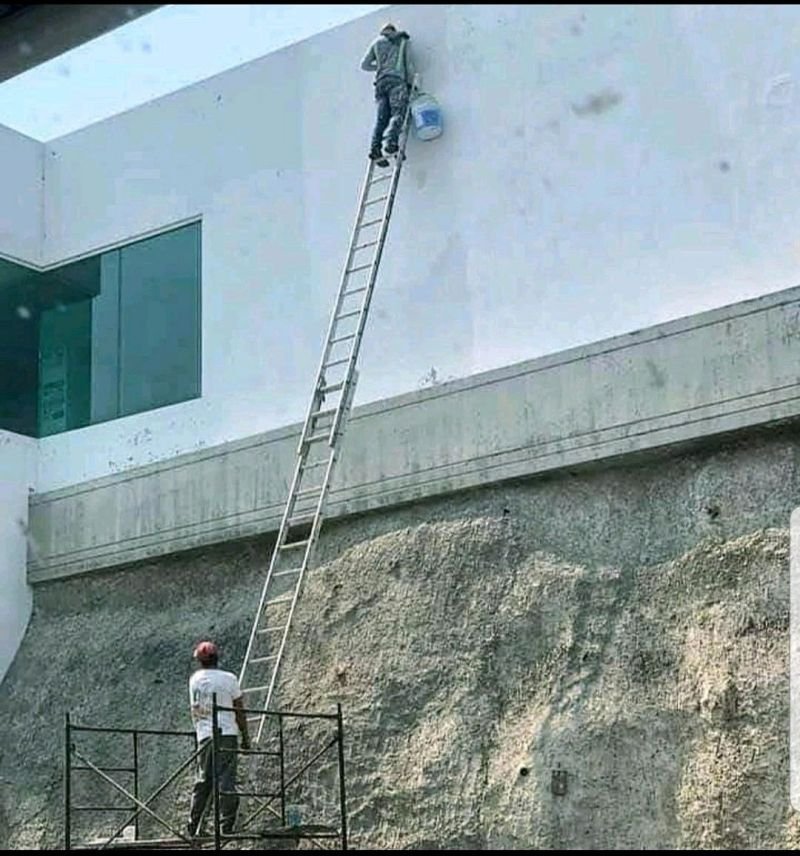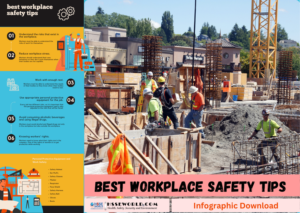Photo of the day: DO’S and DON’TS of Working At Heights
In the Photo of today, try to find out the potential hazards and control Measures to avoid such hazards occurs

Working at heights means that an individual is working in a place that requires necessary precautions to prevent them from falling at a distance, resulting in serious injury. Did you know injuries from working at heights is one of the most prominent causes of major work-related injuries and fatalities? Falls from ladders, scaffolding, and lifts onto debris can cause serious injury even when the height is perceived to not be dangerous. Employers need to ensure that they take all measures necessary to lower the risk of their workers falling from a height using preemptive hazard recognition to constant site assessment.
Fall prevention should not be taken lightly. In 2016, 11,495 lost-time injury (LTI) claims were made in Ontario alone. That is 31 workers a day suffering from serious injury due to falls. Nine resulted in fatalities, while 70% of those falls were the same level falls (ground level). But, first of all, workers should try to avoid working at height if at all possible. If they can’t, they should ensure that they use the right equipment and safety procedures for their specific task, ensuring their personal workspace is safe for themselves and others around the site. Remember to secure all items when at height, as falling tools is as big a hazard as falling people! Be sure to be following all guidelines set out by your employer and the Ontario Government
THE DO’S & DON’TS OF WORKING AT HEIGHTS
- DO as much work as you can while you are on the ground.
- DO make sure that the employees can safely move to and from the area where they are working at height.
- DO ensure that the equipment that you’re using for the job is strong, stable, and suitable enough to get the job done. Inspect and maintain them regularly.
- DO be careful when you are working near to a fragile surface.
- DO ensure that you are protected from falling objects.
- DO make preparations for emergency evacuations and rescues.
- DON’T overload the ladders that they are working on, with equipment or materials.
- DON’T try to reach too far when you’re on a ladder or stepladder.
- DON’T use ladders or stepladders to do work that entails heavy or strenuous tasks. Only use them to do work that’s quick and light.
- DON’T allow incompetent workers to do any work at height.
- DON’T lean or place the ladder on or fragile upper surfaces.
- DON’T stay quiet when you feel someone is compromising their own safety or the safety of others
Download the photo
More photos:
- Photo of the day: Identify the Hazards
- Photo of the day: Hand safety Facts
- Photo of the day: What are the hazards
- Photo of the day: Outline Safety observations
- Photo of the day: Safety Leader
- Photo of the day: Unsafe Conditions
- Photo of the day: Why is PPE important?
- Photo of the day: DO’S and DON’TS of Working At Heights
- Photo of the day: 5 Tips to keep your Crew Healthy and safe at work
- Photo of the day: Tracking Near Miss Incidents
- Photo of the day: 10 Elements of Successful Behavior-Based Safety Program
- Photo of the day:5-Signs your Near-Miss Reporting is failing
- Photo of the day:7 Ineffective Safety Practices (And What To Do Instead)
- Photo of the day:5 keys for effective Self-Management in lone worker safety
- Photo of the day: FrontLine supervisors are the LINCHPINS of safety
- Photo of the day: Fostering Engagement at the front line
- Photo of the day: workplace Hazards
- Photo of the day: What is the line of fire
- Photo of the day: How to Avoid the Fatal Four
- Photo of the day: Fire Safety checklist for workplace
- Photo of the day: Most common safety incidents in the workplace
- Photo of the day: Fire Emergency
- Photo of the day: Ladder Safety Tips
- Photo of the day: 8 Basic steps to wear a safety harness
- Photo of the day: You can prevent workplace Falls
- Photo of the day: Top10 Injuries in office work
- Photo of the day: Overhead powerline safety
- Photo of the day: Eyes on the Road The challenges of safe driving
- Photo of the day: 5 Ways to Reinforce Commuting With Positive Reinforcement
- Photo of the day: Safe Lifting at work
- Photo of the day: 5 Essential outcomes of an effective leadership survey process
- Photo of the day: Conveyors Safety Tips
- Photo of the day: Confined Space rescue
- Photo of the day: Construction Site fire Safety
- Photo of the day: Chemical Spill Emergency Response
- Photo of the day: Electric shock survival
- Breath Safely: The Proper Use of Respiratory Protection
- Photo of the day: Confined space safety Precautions
- Photo of the day: Choosing the Right Face Mask and the difference between a respirator and face mask
- Photo of the day: Importance of Mock drill and Fire Action Emergency Procedure
- H2S Gas and how to handle its Emergency
- Your steps to chemical safety
- Photo of the day: hierarchy of controls
- Photo of the day: Tips to reduce Heat stress in the workplace
- Photo of the day: Safety Equipment for Confined Spaces
- Photo of the day: Dangerous Goods Classes
- Photo of the day: Trenching Safety Tips That Can Save a Life
- Photo of the day: Mental health in the workplace
- Photo of the day: Emergency preparedness in the workplace
- Photo of the day: musculoskeletal disorders
- Photo of the day: Workplace Inspection
- Photo of the day: New worker Orientation & Safety Orientation checklist
- Photo of the day: Effective Health and Safety Committees
- Photo of the day: 10 Scaffold Safety Essentials
- Photo of the day: Incident Investigations
- Photo of the day: Preventing the spread of contagious illness
- Photo of the day: 5 ways to reduce the risk of Slipping and Tripping
- Photo of the day: Sitting at work
- How to use Plate Clamps Safely: Safety Moment#34
- Photo of the day: working in heat and Humidex Rating
- Photo of the day: Don’t be Driven to Distraction
- Photo of the day: Fatigue at Work
- Photo of the day: Noise in the affected workplace
- Photo of the day: Indoor Air Quality
- Photo of the day: WHMIS 2015 – Pictograms
- Photo of the day: Personal Protective Equipment last resort
- Photo of the day: Manual Material handling
- Photo of the day: Controlling COVID-19 in the Workplace-Physical Barriers
- Photo of the day: Generator Safety
- Photo of the day: Position for safety and comfort-Safety Tips
- Photo of the day: Cannabis and Impairment in the Workplace
- Photo of the day: sun safety in the workplace
- Photo of the day: Top FIVE Heavy Equipment Construction Site Safety Tips
- Photo of the day: Work-Related Asthma
- Photo of the day: choosing the right Anchorage
- Photo of the day: Protect your Head
- Photo of the day: Extension Cord Safety Tips
- Photo of the day: Concrete Truck Driver Hand Signals
- Photo of the day: Safe use of ladders and step ladders
- Photo of the day: Arc-Fault Circuit Interrupters (AFCI)
- Photo of the day: HSE Bulletin Board
- Photo of the day: Scissor Lift Safety
- Photo of the day: Managing Risks of Exposure to Solvents in the workplace
- Photo of the day: Flagman and Traffic control
- Photo of the day: Run Project safely with Crane Hand Signals
- Photo of the day: Read All Labels Work safe
- Photo of the day: Flood Safety Tips
- Photo of the day: Fall Protection Plans
- Photo of the day: Lockout and Tagout Safety
- Photo of the day: Types of Hand Protection
- Photo of the day: Types of Foot Protection
- Photo of the day: Floor Marking
- Photo of the day: Overhead Power lines Clearance



